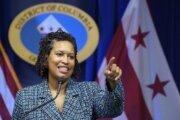RICHMOND, Va. (AP) — Virginia Gov. Glenn Youngkin’s administration said Tuesday that it has finalized new policies on the treatment of transgender students, guidance that will direct school districts to roll back some current accommodations and increase parental notification requirements about certain discussions involving gender identity.
Youngkin said the guidelines, which have been sharply criticized by LGBTQ+ advocacy groups since they were first unveiled last year, will empower parents while prohibiting discrimination and creating a safe learning environment.
“This is about doing what’s best for the child,” Youngkin said in an interview with The Associated Press. “And oh, by the way, also recognizing that we need to ensure the privacy and dignity and respect of all children and all parents in the school system. And that’s what I think we have … very carefully constructed here.”
The Republican governor’s administration first advanced the proposed changes in September 2022, sparking protests from student activists around the state. The changes were then subject to a public comment period, and tens of thousands of opinions rolled in that the Department of Education has spent months reviewing.
Now, in accordance with a 2020 state law, school boards will be asked to adopt policies that are consistent with the department’s.
The guidance says students’ participation in certain school programming and use of school facilities like bathrooms or locker rooms should be based on the sex assigned at birth, with modifications offered only to the extent required under federal law.
The finalized version adds an “opt out” option for parents to request that their children be given access to a sex-separated facility in cases where “state or federal law requires schools to permit transgender students to share otherwise sex-segregated facilities (such as bathrooms or locker rooms) with students of the opposite sex.”
The policies also say that students who are minors must be referred to by the names and pronouns in their official records unless a parent approves the use of something else.
Regarding parental notification, the guidelines say school divisions may not encourage teachers to conceal information about a student’s gender from his or her parents, a provision critics said could lead to harm if children are in unsupportive home environments. The finalized version adds language that reminds school divisions they must comply with a state law governing communication about a perceived imminent risk of suicide by a student.
The guidelines also say parents must be given an opportunity to object before counseling services pertaining to gender are offered.
“What we’re not saying is that trusted counselors and other trusted adults in a child’s life should be excluded. What we are … saying is that parents just need to be involved and are the first stop. And then collectively there is … a support mechanism around a child that can be most effective,” Youngkin said.
The revisions mark a departure from guidance first issued in 2021 during Democratic Gov. Ralph Northam’s administration that said schools should let students use names and gender pronouns that reflect their gender identity without “any substantiating evidence.”
The previous guidelines also said students could participate in programming and access facilities in a manner consistent with their gender identity and urged schools to weigh sharing information about students’ gender identity with parents on a “case-by-case” basis, considering the health and safety of students.
The changes have been welcomed by conservative lawmakers and advocacy groups.
“We are pleased that Governor Youngkin has worked to fulfill his campaign pledge to affirm the right of parents to raise their children without government interference,” Dr. Todd Gathje, vice president of government relations for The Family Foundation, said in a written statement.
But Democratic lawmakers and LGBTQ advocacy groups have strenuously objected, warning that already vulnerable youth will be further put at risk.
“Today, Governor Youngkin and the VDOE made a dangerous, politically motivated decision to ignore the thousands of Virginians who submitted public comments in opposition to his proposed model policies — policies which single out transgender and nonbinary youth in our schools,” Narissa Rahaman, executive director of Equality Virginia, said in a statement.
It remains to be seen how school districts, particularly those in blue-leaning areas of the state, will respond.
Virginia’s initial guidance was developed in accordance with the bipartisan 2020 law, which required the Department of Education to craft the policies concerning the treatment of transgender students. But many school boards never adopted the first set.
“We encourage all school divisions to review the policies and implement them into their local policies in collaboration with their school boards and community stakeholders,” Superintendent of Public Instruction Dr. Lisa Coons said in a statement.
Some LGBTQ+ advocates have suggested the changes could be contested in court.
Youngkin has previously said that he believes decisions about medical care for transgender children should be made by parents, in consultation with their child and a trusted doctor.
He reiterated that position Tuesday, saying, “I think that there should not be a decision made around a child’s education, their upbringing or their care that … doesn’t start with parents.”
Youngkin, who often objects to hypothetical questions, declined to say if he would veto a bill restricting or banning gender-affirming care for transgender minors. Many other Republican-led states have recently passed such restrictions.
Copyright © 2024 The Associated Press. All rights reserved. This material may not be published, broadcast, written or redistributed.







